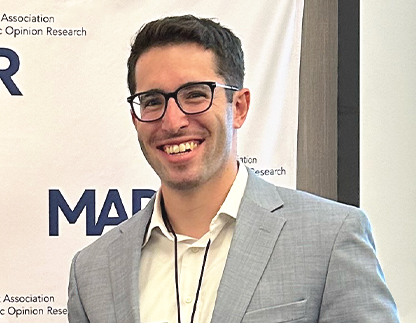To witness, and to play a role in students strengthening their skills makes me enormously proud.”
Jonathan Schulman
PhD Candidate in the Department of Political Science

Jonathan Schulman is a PhD candidate in the Department of Political Science in the Weinberg College of Arts and Sciences. He is interested in U.S. foreign policy and the ways that public opinion and social mobilization (in the U.S. and abroad) can affect foreign policy outcomes. His work also explores how trust in scientists and researchers drives key outcomes related to public health, political violence, and the legitimacy of elections. Jonathan received the Doris Graber Award at the 2023 Midwest Association for Public Opinion Research (MAPOR) Conference for the best graduate student paper on public opinion.
How would you describe your research and/or work to a non-academic audience?
My research examines how people form their political opinions and how those opinions affect actual policy outcomes. My dissertation focuses on attitudes on foreign policies, specifically looking at how anxieties over national status affect peoples’ opinions, views of leaders, and policy outcomes. My other work focuses on attitudes toward scientists and how trust in science affects things like political polarization and willingness to follow the advice of experts during the COVID-19 pandemic.
Tell us what inspired your research and/or work.
As an undergraduate at Ohio State, I took many classes early on about international security, theories of war, and foreign policy, where we discussed the strategy and rationality that goes into a government deciding to initiate a conflict. However, in a history course on the Vietnam War, I became intrigued by the notion that states will sometimes make significant choices, such as entering into war, not based on what we would typically consider strategic decision-making. Instead, these decisions can stem from factors like concerns about their state's reputation, global standing, or the leader’s personal reputation.
Because of this course, I also became fascinated by the idea that public opinion could affect the foreign policies leaders choose or don’t choose to enact. I didn’t realize it at the time, but Mitch Lerner’s History of the Vietnam War course in many ways sparked my early research interests, well before I was even considering going to graduate school.
What is the biggest potential impact or implication of your work?
The biggest takeaway from my work is that words matter. When leaders and candidates deliberately cause anxiety about foreign policy or global standing to secure votes, those words have a real and pronounced effect on the public’s foreign policy preferences, and even foreign policy outcomes. Similarly, when prominent leaders raise doubt over whether science and scientists should be trusted, those words, too, have substantial effects on the actions people take during a public health crisis.
What did you originally want to be when you grew up?
I wanted to be a sports agent for the longest time—until I realized that meant going to law school and studying contracts, which I had no interest in doing. I liked sports, but I knew early on that playing professionally wasn’t in the cards for me.
What advice would you give your younger self or someone considering a similar path?
Pursue the career that you love. Getting a PhD is hard work, but if you appreciate developing your own research questions and thinking of innovative ways to solve them, you will enjoy it. Graduate school is stressful, but studying something you are passionate about can make it a rewarding and fun experience, too.
Tell us about a current achievement or something you're working on that excites you.
I recently accepted a postdoctoral fellowship at the University of Pennsylvania which will begin in July 2024. I’m extremely thrilled to be able to continue the work I’m passionate about and meet a new community of scholars who share that passion, while also getting to explore a new city!
What are you most proud of in your career to date?
I am most proud of my teaching—particularly when teaching research methods courses, where students often enter the class feeling anxious about their ability to follow along with and contribute to discussions about conducting good research. It is so rewarding to see students grow in confidence and eventually design a research proposal that genuinely interests them. To witness, and to play a role in students strengthening their skills makes me enormously proud.
Publish Date: February 20, 2024
If you know a graduate student, postdoctoral scholar, graduate faculty member, staff member, or a member of our TGS alumni population who would make a great candidate for our TGS Spotlight Series, please complete this brief TGS Spotlight Series Nomination Form.